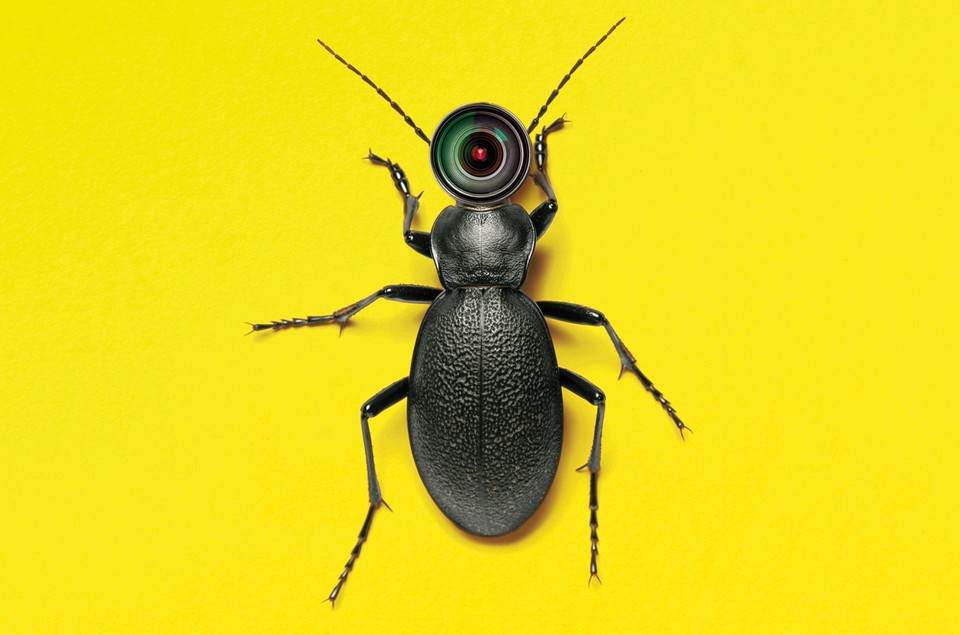Here’s how governments, terrorists, corporations, identity thieves, spammers, and personal enemies could observe us in the future, and how we might respond.
1 | Cameras Will Be Invisible
Many of the cameras that can be pointed at us today are easy to spot. But researchers are developing recording devices that can hide in plain sight, some by mimicking animals. A company called AeroVironment has produced a drone that looks and flies like a hummingbird. Engineers at Carnegie Mellon, nasa, and elsewhere have designed “snakebots” that can maneuver in tight spaces and could be adapted for surveillance. Robotic bugs are in development, too, and engineers at UC Berkeley and in Singapore are developing cyborg beetles—real insects that can be remote-controlled via implanted electrodes and that might someday pack cameras.
If even an insect is too obvious, Kristofer Pister, an engineer at Berkeley, and David Blaauw, an engineer at the University of Michigan, are developing “smart dust” and “micro motes,” respectively: tiny computers mere millimeters wide that can be equipped with cameras and other sensors. One can (or can’t, as it were) see where this is going.
If even an insect is too obvious, Kristofer Pister, an engineer at Berkeley, and David Blaauw, an engineer at the University of Michigan, are developing “smart dust” and “micro motes,” respectively: tiny computers mere millimeters wide that can be equipped with cameras and other sensors. One can (or can’t, as it were) see where this is going.
2 | Your Past Will Be Omnipresent
Imagine this: You walk into a car showroom and before you say anything, the dealer knows your name, employment status, car-buying history, and credit rating. Such a future isn’t far off, says Christopher Soghoian, the principal technologist at the ACLU.Already, data brokers such as Acxiom and LexisNexis compile reams of information on all of us. Clients can purchase a dossier on your criminal, consumer, and marital past. Soghoian thinks it’s only a matter of time before data brokers begin drawing from online-dating profiles and social-media posts as well.
Right now, clients have to log in and search for people by name or buy lists of people with certain traits. But as facial-recognition technology becomes more widespread, Soghoian says, any device with a camera and the right software could automatically pull up your information. Eventually, someone might be able to point a phone at you (or look at you through smart contact lenses) and see a bubble over your head marking you as unemployed or recently divorced. We’ll no longer be able to separate our personae—our work selves from our weekend selves. Instead our histories will come bundled as a pop-up on strangers’ screens.
3 | Machines Will Decide Our Fates
As the data collected by all the devices around us become overwhelming, we’ll increasingly rely on artificial intelligence to sift through them and make decisions, says Gary T. Marx, the author of Windows Into the Soul: Surveillance and Society in an Age of High Technology. Algorithms are already used to identify potential terrorists, as well as to generate credit ratings and parole recommendations. Chicago police use an algorithm that analyzes arrest records, social networks, and other data to identify future criminals. Soon, bots will likely guide many aspects of personnel management, such as hiring and firing.Researchers have called the scenario in which humans are removed from the decision loop the “machine-readable world.” “Basically,” Schneier says, “we’re creating a world-size robot,” a system with sensors, processors, and actuators that can manipulate the world by, say, approving loans or steering cars.
uch automation may increase efficiency, but it won’t eliminate injustice. For one thing, algorithms make mistakes. “If Facebook gets your profile wrong, they show you an ad for a Chevy you don’t want to buy,” Schneier says. “If the Department of Defense gets your profile wrong, they drop a drone on your house.” Algorithms also embody the prejudices of their programmers, or generate their own—a point that was driven home in May when ProPublica exposed how a correctional tool used across the country to inform sentencing decisions overestimates the recidivism rate of black defendants. Maciej Cegłowski, a blogger and programmer, has called machine learning “money laundering for bias.”
4 | Society Will Be Safer but Creepier
Studies show that security cameras reduce street crime in urban areas, but surveillance also tends to suppress certain types of noncriminal activity, creating a chilling effect on our freedoms. For instance, after Edward Snowden revealed the extent of the National Security Agency’s spying on citizens in 2013, Google searches for terrorism-related terms such as al‑Qaeda dropped, suggesting an inhibition of free inquiry.
Marlinspike further argues that with constant surveillance, law enforcement will have dirt on everyone, at which point enforcement will become selective, and likely biased. Annoy the wrong person and you’re in trouble.But along with surveillance comes “sousveillance,” the ability to watch our watchers. David Brin, a scientist and the author of The Transparent Society, predicts that eventually we’ll solve more crimes and need fewer cops, and also have a lot less police brutality. (Phone cameras have already helped give rise to the Black Lives Matter movement.) A Big Brother society results not from being watched but from one-way observation, he says. “We don’t want blinded watchdogs. What we want is a choke chain around the watchdog’s neck.”
Perhaps we’ll also see a shifting of social norms. If everyone’s embarrassing behavior is accessible in perpetuity, we may become inured to employees’ college benders and even to senators’ sexts. Will paranoia reduce misbehavior, or will humans be humans and maintain our blithe and blundering ways? “It’s hard to change our daily habits,” says Jonathan Zittrain, a co-founder of Harvard’s Berkman Klein Center for Internet & Society. “I don’t know if that’s a reason for optimism, because it means we’re not going to be chilled, or pessimism, because we appear to be resigned to losing our privacy without thinking it through first.”



Comments
Post a Comment
Type message here